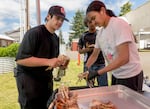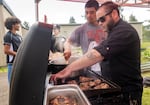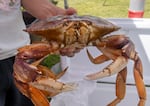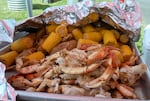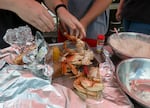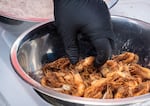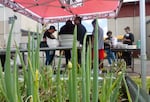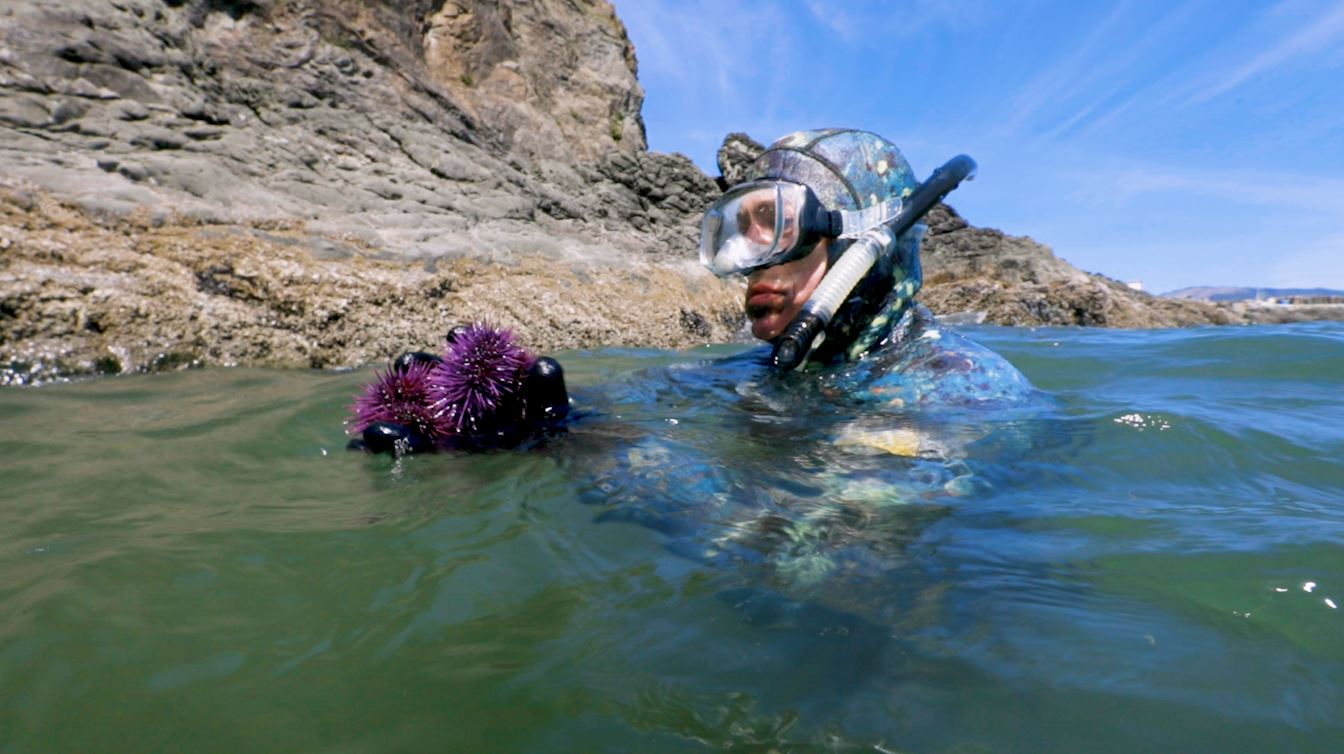
Tom Calvanese harvests purple urchins.
Stephani Gordon / OPB
Oregon has invested millions in workforce development across the state. But a program aimed at helping workers and businesses along the coast will be ending soon. Northwest Oregon Works serves Benton, Clatsop, Columbia, Lincoln and Tillamook counties.
The nonprofit has supported the state’s maritime industry and has funded projects for organizations including Newport Fishermen’s Wives, Oregon State University and the Oregon Coast Visitors Association. OoNee Sea Urchin Ranch also received funding to train divers and aquaculture interns.
The ranch aims to sustainably harvest sea urchin in the state. It collects urchins and feeds them on land. It processes uni, the organ found in sea urchins that’s considered a culinary delicacy, in Newport.
We learn more about the future of the maritime industry in Oregon from OoNee Sea Urchin Ranch CEO Aaron Huang and Len Tumbarello, the Maritime Program Coordinator for Northwest Oregon Works.
Note: The following transcript was transcribed digitally and validated for accuracy, readability and formatting by an OPB volunteer.
Dave Miller: This is Think Out Loud on OPB. I’m Dave Miller. Two years ago, Oregon lawmakers put $2 million towards workforce development along and near the Oregon Coast, in Clatsop, Columbia, Lincoln, Tillamook and Benton counties. Most of that money, which will be running out at the end of June, was dispersed by Northwest Oregon Works.
Len Tumbarello is the maritime program coordinator for the nonprofit. Aaron Huang is the CEO of OoNee Sea Urchin Ranch, which received one of the workforce development grants. They both join us now. It’s great to have both of you on Think Out Loud.
Aaron Huang: Thanks.
Len Tumbarello: Good afternoon, Dave. Thanks for having us.
Miller: It’s great to have you both. Len, what is the big idea behind Northwest Oregon Works?
Tumbarello: Well, Northwest Oregon Works is a workforce development board that, like you said, serves five counties: Benton, Clatsop, Columbia, Lincoln and Tillamook. Their reason for existence is to use federal, state and local funds to help individuals develop their careers, and to bridge the gap for businesses looking for prospective employees.
Miller: The first grant, if I’m not mistaken, that you approved through this program allowed for a little over $60,000. It allowed the Oregon Coast Community College to hire an additional welding instructor. Why was that a priority for you?
Tumbarello: Well, I think mainly the money became available in 2024 and I was hired in May of 2024. The biggest challenge was getting the exposure out that we had this money, and I was the source that people could put funding requests through. Oregon Coast Community College obviously got the message, and they took advantage of that and requested the funds. Once they put in the request, obviously welding is a very needed ability in the maritime world, there’s a lot of steel out there. They needed another welding instructor to increase their throughput, so we approved that request.
Miller: Can you give us a sense for some of the other grants that your organization has given out?
Tumbarello: As far as the maritime is concerned, we’ve given money to individuals that either are in the maritime world or would like to get into them, so that they can get certificates and the training necessary to break down the barriers to employment for them. Businesses like OoNee, trying to enhance their operations through internships and certifications for new employees. And then we’ve also, like the Oregon Coast Community College, helped several of the community colleges along the coast either add new programming to their course offerings or beef up the existing ones.
Miller: Aaron, what is OoNee Sea Urchin Ranch?
Huang: We are a land-based sea urchin ranch. We operate in Newport, which is our headquarters. And effectively what we are doing is we’re pulling overgrazing purple sea urchins off the coastal kelp forests in Southern Oregon to keep them from decimating the remaining kelp forests. We’re pulling them back on land. They’re starved out and they’re empty because there’s no more kelp there. And we’re essentially fattening them on land, shucking them like you would kind of like an oyster, and we’re selling them to local and regional restaurants in Portland and beyond.
Miller: This is an issue that we’ve talked about in the past – the loss of kelp forests, sea star wasting disease, a complicated ecosystem but which has led to some really devastating effects. But the first piece of your business model that you mentioned is pulling purple sea urchins off of the sea floor. How complicated or hard is that to do, the first piece before you can fatten them up in a place that doesn’t decimate an ecosystem?
Huang: It’s not a cakewalk. If any listeners have been diving in other parts of the world – Hawaii, parts of the Pacific or the Caribbean – the water in Oregon, it’s quite turbid, there’s a lot of detritus in the water. It’s cold throughout most of the year because we have this cold upwelling. So when you get into the water, it can be quite disorienting and you have to wear lead weights to keep yourself from floating up to the surface. And essentially, you’re basically crawling around in the water, pulling these urchins out of the water, putting them into a mesh bag, filling the mesh bag with the CO2 cartridge balloon that floats back up to the surface, rinse and repeat for a number of hours. A good urchin diver, on their best day, can pull up to 1,000 pounds of these urchins out of the water.
Miller: Why did you apply for a grant from Northwest Oregon Works for one of these maritime workforce development grants?
Tumbarello: Yeah, it’s simple. Before Len came around, we started probably a year before we had heard about them, and honestly, we were just out there doing everything mechanically. We were getting in the water, we were pulling urchins out, we were trying to get them on land. We were basically hand building a prototype to fatten these urchins, and we were just driving around Portland and Seattle selling these things. So we were already looking for local support. There are definitely some supports at the county levels, there’s definitely some support at the city levels.
And then regionally, when Northwest Oregon Works came around, the biggest thing with them is that they were able to infuse the workforce grants directly into our organization. We basically could take those grants and flexibly train folks on these implements and skills required to actually get in the water, fatten these urchins on land and shuck these urchins. These are three things that a lot of folks have really never done before. I think Len and their organization saw the potential of this new blue economy, that it can essentially rebuild lost jobs on the coast. It was great for us to actually have them be around for that.
Miller: Did you end up hiring people that you wouldn’t have been able to, if their training hadn’t been paid for with these public dollars?
Huang: Yes, that training was critical because these skills are not necessarily turnkey. There’s no one that actually comes shovel-ready with these skills. And in order to really get folks acclimated to the three main skill sets that we need – diving, ranching and processing – that ramp time is critical because once they’re operating, then you can actually start driving towards a sustainable business. But that ramp time takes quite a while to get folks trained up on the coast. So it’s absolutely critical.
Miller: Len, what do you think Oregonians might not appreciate or understand about Oregon’s current maritime economy?
Tumbarello: Well, I think it’s just great to be on your show, Dave, to gain some exposure and be able to advocate for the vital maritime industry that’s in Oregon. I was in the Coast Guard for 28 years and then I ran a seamanship program for 10, so I’ve been a lifelong mariner. I think the maritime industry at times is underappreciated, undervalued. I live in Astoria, you look out at the Columbia River … and if I asked a young person what the Columbia River represents, they’d probably say “oh, it’s a beautiful body of water.” But it means so much more. When I look out at the Columbia River, it signifies to me that it’s about a $25 million a year operation to the nation.
So I think that’s the biggest thing, is that in the state of Oregon, we have about 40,000 employees that are employed in the maritime industry. It brings in about $3.4 billion in state revenues every year.
Miller: How much do you feel like you’re trying to boost or maybe even resuscitate existing industries that have declined in recent decades, as opposed to what we are hearing from Aaron, which is supporting a really new one?
Tumbarello: And to go back to Aaron, when I met with Aaron the first time, I think his counterpart Brad told me that in the ‘90s, the sea urchin harvesting industry was a multiple-million-dollar industry. Now, they’re doing it artificially or doing it on land, and maybe we can revitalize that to be like it was in the ‘90s.
As far as the maritime industry throughout Oregon, obviously it means a lot to a lot of people. And we want to make sure that the industry has the employees necessary to do it safe and effectively.
Miller: Aaron, what other kind of economic development or workforce development would you like to see in Newport or other parts of the Oregon Coast? In terms of the bigger picture, what do you think is most necessary?
Huang: I definitely think that if you look at the types of funding available, there needs to be almost concentric circles of funding, where companies of our size, we can have the benefit of tapping and collaborating with Len and his organization. I think if you kind of inevitably ask, “And now what?” if you start to wrap around an ecosystem where there’s larger and larger funding, both from a private perspective but obviously from a public perspective, I think that helps a lot of private companies get off the ground. I think a lot of private companies on the coast will probably tap grant funding like this to start. From a private funding perspective, really galvanizing and trying to get that follow-on capital is super important for organizations like us.
Miller: Len, you mentioned earlier that this has been in the past reliant on federal, state and local funding. We’ve been talking about what is state funding here from the legislature, but where does federal funding stand right now in the context of talks of massive federal cuts and the reality of, in many places, a still existing federal freeze?
Tumbarello: Well, I only can speak for Northwest Oregon Works, Dave. And to date, we haven’t heard or felt any cutbacks from that.
Miller: Aaron, what about you? What have you heard?
Huang: This is definitely related to my last response. We are still awaiting some updates from our USDA program manager, as you can probably ascertain from the model that we were espousing. There’s a fair amount of resiliency we’re baking into our blue economy business model, and some aspects of that may or may not comport with the new administration. So we’re definitely seeking clarity on grants that we’ve been earmarked for this year but are currently frozen.
Miller: If you were writing a grant now, would you write about your work in a different way to make it more likely that you could get federal funds going forward?
Huang: Yeah, I definitely thought about this last year. It’s really hard to read the tea leaves. And definitely I don’t think anyone assumed that the types of federal grants that we would be applying to, namely the SBIR program, which has been supported by both Democratic and Republican administrations for many, many years now … That SBIR program is single digit percentages of federal agency budgets and pretty sacrosanct in terms of how most agencies do not touch that budget. But there are definitely key words that we would probably have to remove if we were to try to focus more on our mission and reposition for future grant funding.
Miller: Aaron and Len, thanks very much.
Tumbarello: Thank you, Dave. Appreciate it.
Miller: That is Len Tumbarello, who does maritime grantmaking for workforce development for Northwest Oregon Works, and Aaron Huang.
Contact “Think Out Loud®”
If you’d like to comment on any of the topics in this show or suggest a topic of your own, please get in touch with us on Facebook, send an email to thinkoutloud@opb.org, or you can leave a voicemail for us at 503-293-1983. The call-in phone number during the noon hour is 888-665-5865.



